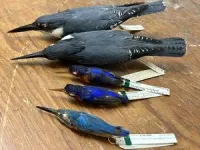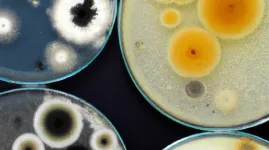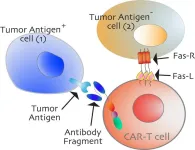(Press-News.org) Bacterial diversity in the gut plays an important role in human health. The crucial question, however, is where are the sources of this diversity? It is known that an important part of the maternal microbiome is transferred to the baby at birth, and the same happens during the breastfeeding period via breast milk. Further sources were yet to be discovered. However, a team led by Wisnu Adi Wicaksono and Gabriele Berg from the Institute of Environmental Biotechnology at Graz University of Technology (TU Graz) has now succeeded in proving that plant microorganisms from fruit and vegetables contribute to the human microbiome. They report this in a study published in the journal Gut Microbes.
You are what you eat
The authors were able to demonstrate that the frequency of fruit and vegetable consumption and the variety of plants consumed influences the amount of fruit- and vegetable-associated bacteria in the human gut. Early childhood in particular represents a window of opportunity for colonisation with plant-associated bacteria. It was also demonstrated that the microorganisms of plant origin have probiotic and health-promoting properties.
A microbiome is the totality of all microorganisms that colonise a macroorganism (human, animal, plant) or a part of it, for example the intestine or a fruit. While the individual microbiomes are becoming better understood, little is known about their connections. “The proof that microorganisms from fruits and vegetables can colonise the human gut has now been established for the first time,” explains first author Wisnu Adi Wicaksono. This suggests that the consumption of fruit and vegetables, especially in infancy, has a positive influence on the development of the immune system in the first three or so years of life, as the intestinal microbiome develops during this time. But even after that, a good diversity of gut bacteria is beneficial for health and resilience. “It simply influences everything. Diversity influences the resilience of the whole organism; higher diversity conveys more resilience,” says Institute head Gabriele Berg.
Several billion sequences
In order to be able to determine that the consumption of fruits and vegetables and their microbiomes actually leads to changes in the intestinal microbiome, the team first created a catalogue of microbiome data from fruits and vegetables which enabled them to assign their bacteria. They compared these with publicly available data from two studies on intestinal flora. The TEDDY project looked at the development of babies in a long-term study and the American Gut Project studied the intestinal microbiome of adults – both projects also collected data on the food intake of the test persons. In total, the researchers had metagenome data from around 2500 stool samples at their disposal, each of which contained between one and ten million sequences – several billion sequences were thus evaluated. Using this extensive data set, the presence of fruit and vegetable microflora in the gut could be demonstrated. This evidence is a crucial building block in proving the WHO’s One Health concept, which closely links human, animal and environmental health.
Follow-up study on three continents
To further explore this connection, together with international colleagues and within the EU-funded HEDIMED project (www.hedimed.eu) Gabriele Berg at the Institute of Environmental Biotechnology is already working on an intervention study in which people on three continents eat exactly the same things for a certain period of time, following which their excretions are analysed. But even beyond that, Gabriele Berg sees many areas that could be influenced on the basis of the study’s findings. This starts with food production, as soil, fertiliser and pesticides affect the plant microbiome. “Fresh fruit and vegetables will always have the best microbiome; agriculture or processing companies already have a major influence here. And the storage and processing of food must also be critically reconsidered,” explains Berg. Depending on the findings of the planned study, there could also be exciting applications for individuals. “Every fruit and vegetable has a unique microbiome. So maybe at some point a personalised diet can be put together based on that.”
This research is anchored in the Field of Expertise "Human & Biotechnology", one of five strategic foci of TU Graz.
END
Proven for the first time: The microbiome of fruit and vegetables positively influences diversity in the gut
In a meta-study, a research team from the Institute of Environmental Biotechnology at Graz University of Technology has provided evidence that the consumption of fruit and vegetables contributes positively to bacterial diversity in the human gut.
2023-10-24
ELSE PRESS RELEASES FROM THIS DATE:
NEJM: study supports minimally invasive procedure as aortic stenosis treatment
2023-10-24
Patients with a dysfunctional aortic heart valve who received a new, prosthetic valve through a minimally invasive procedure had similar outcomes at five years as those who underwent open-heart surgery, a new study shows.
The international multicenter study, with key contributions by the Cedars-Sinai heart team and published in The New England Journal of Medicine, offers a more complete picture to the ongoing dialogue comparing the minimally invasive heart procedure—called transcatheter aortic valve replacement, or TAVR—to open-heart surgery.
“Our data at five years validate that TAVR is a good alternative to open-heart surgery in younger patients with aortic ...
New study shows which neighborhoods police spend most time patrolling
2023-10-24
BLOOMINGTON, Ind. – Using anonymized smartphone data from nearly 10,000 police officers in 21 large U.S. cities, research from Indiana University finds officers on patrol spend more time in predominantly Black and Hispanic neighborhoods.
“Research on policing has focused on documented actions such as stops and arrests – less is known about patrols and presence,” said Kate Christensen, assistant professor of marketing at the IU Kelley School of Business.
“Police have discretion in deciding where law enforcement is provided within America’s cities,” she said. “Where police officers are located matters, because it affects ...
Preventing airborne infection without impeding communication with ions and electric field
2023-10-24
A novel device developed by researchers from Tokyo Institute of Technology, Tokyo Medical and Dental University, and Chiba University in a new study utilizes ions and an electric field to effectively capture infectious droplets and aerosols, while letting light and sound pass through to allow communication. The innovation is significant in the wake of the COVID-19 pandemic, since it shows promise in preventing airborne infection while facilitating communication.
Airborne infections, such as H1N1 influenza, SARS, and COVID-19, are spread by aerosols ...
Small but mighty: the hidden power of broccoli sprouts
2023-10-24
Remember when your parents used to say, “Eat your greens, they are good for you”? Well, they were really onto something. Several studies have shown that higher intakes of cruciferous vegetables like broccoli, one of the most widely consumed vegetables in the United States, are associated with reduced risks of diseases such as diabetes and cancer, thanks to their organosulfur compounds, such as glucosinolates and isothiocyanates that exhibit a broad spectrum of bioactivities including antioxidant activity. However, few studies have focused on ...
Are retrospective adjustments to sustainability reports helping CEOs score a bonus?
2023-10-24
A lack of clarity around sustainability reporting is allowing ASX-listed companies to retrospectively alter figures, ensuring CEO bonus pay tied to these metrics is realised, new research suggests.
Sustainability reports serve as critical tools for investors, regulators and other stakeholders to gauge a company's environmental, social, and governance (ESG) performance. They highlight issues such as environmental pollution and worker safety that might otherwise be overlooked.
Close to 90% of ASX top 200 companies provide detailed ESG information. Many of these ...
Cathode active materials for lithium-ion batteries could be produced at low temperatures
2023-10-24
Layered lithium cobalt oxide, a key component of lithium-ion batteries, has been synthesized at temperatures as low as 300°C and durations as short as 30 minutes.
Lithium ion batteries (LIB) are the most commonly used type of battery in consumer electronics and electric vehicles. Lithium cobalt oxide (LiCoO2) is the compound used for the cathode in LIB for handheld electronics. Traditionally, the synthesis of this compound requires temperatures over 800°C and takes 10 to 20 hours to complete.
A team of researchers at Hokkaido University and Kobe University, led by Professor Masaki Matsui at Hokkaido University’s Faculty of Science, have developed a new method to ...
How to slow the spread of deadly ‘superbugs’
2023-10-24
Harnessing new advances in genomic surveillance technology could help detect the rise of deadly ‘superbugs’ and slow their evolution and spread, improving global health outcomes, a new Australian study suggests.
Antimicrobial resistance occurs when bacteria, viruses, fungi and parasites change over time and no longer respond to the medicines and chemicals we use to kill them. These ‘superbugs’ make infections harder to treat and increase the risk of disease spread, severe illness and death.
Without significant intervention, global annual deaths involving antimicrobial resistance are estimated ...
Burning sugarcane possible cause of mystery kidney disease in agricultural workers
2023-10-24
AURORA, Colorado (October 23, 2023) - The burning of sugarcane and rice husks may be releasing a toxicant causing a mysterious kidney disease in agricultural workers, according to a paper out today in the American Journal of Kidney Diseases.
An ongoing epidemic of chronic kidney disease has been observed among manual laborers in hot agricultural communities throughout the world, including along the Pacific coast of Central America, India and Sri Lanka. While heat stress and climate change have contributed to this epidemic, researchers have identified tiny silica particles released from sugarcane ash that can be inhaled or ingested through contaminated drinking water that cause ...
Researchers identify ‘switch’ to activate cancer cell death
2023-10-24
A research team from the UC Davis Comprehensive Cancer Center has identified a crucial epitope (a protein section that can activate the larger protein) on the CD95 receptor that can cause cells to die. This new ability to trigger programmed cell death could open the door for improved cancer treatments. The findings were published Oct. 14 in the Nature journal Cell Death & Differentiation.
CD95 receptors, also known as Fas, are called death receptors. These protein receptors reside on cell membranes. When activated, ...
Role of innate immunity in SARS-CoV-2 infection
2023-10-24
https://doi.org/10.1016/j.bsheal.2023.08.005
During severe acute respiratory syndrome coronavirus 2 (SARS-CoV-2) infection, activated macrophages, dendritic cells, neutrophils, and natural killer cells are the first defense against infection. These immune effectors trap and ingest the virus, kill infected epithelial cells, or produce anti-viral cytokines. Evidence suggests that aging, obesity, and mental illness can lead to weakened innate immunity and, thus, are all associated with elevated infection and severe disease progression of coronavirus disease 2019 (COVID-19). ...
LAST 30 PRESS RELEASES:
Natural selection operates on multiple levels, comprehensive review of scientific studies shows
Developing a national research program on liquid metals for fusion
AI-powered ECG could help guide lifelong heart monitoring for patients with repaired tetralogy of fallot
Global shark bites return to average in 2025, with a smaller proportion in the United States
Millions are unaware of heart risks that don’t start in the heart
What freezing plants in blocks of ice can tell us about the future of Svalbard’s plant communities
A new vascularized tissueoid-on-a-chip model for liver regeneration and transplant rejection
Augmented reality menus may help restaurants attract more customers, improve brand perceptions
Power grids to epidemics: study shows small patterns trigger systemic failures
Computational insights into the interactions of andrographolide derivative SRJ09 with histone deacetylase for the management of beta thalassemia
A genetic brake that forms our muscles
CHEST announces first class of certified critical care advanced practice providers awarded CCAPP Designation
Jeonbuk National University researchers develop an innovative prussian-blue based electrode for effective and efficient cesium removal
Self-organization of cell-sized chiral rotating actin rings driven by a chiral myosin
Report: US history polarizes generations, but has potential to unite
Tiny bubbles, big breakthrough: Cracking cancer’s “fortress”
A biological material that becomes stronger when wet could replace plastics
Glacial feast: Seals caught closer to glaciers had fuller stomachs
Get the picture? High-tech, low-cost lens focuses on global consumer markets
Antimicrobial resistance in foodborne bacteria remains a public health concern in Europe
Safer batteries for storing energy at massive scale
How can you rescue a “kidnapped” robot? A new AI system helps the robot regain its sense of location in dynamic, ever-changing environments
Brainwaves of mothers and children synchronize when playing together – even in an acquired language
A holiday to better recovery
Cal Poly’s fifth Climate Solutions Now conference to take place Feb. 23-27
Mask-wearing during COVID-19 linked to reduced air pollution–triggered heart attack risk in Japan
Achieving cross-coupling reactions of fatty amide reduction radicals via iridium-photorelay catalysis and other strategies
Shorter may be sweeter: Study finds 15-second health ads can curb junk food cravings
Family relationships identified in Stone Age graves on Gotland
Effectiveness of exercise to ease osteoarthritis symptoms likely minimal and transient
[Press-News.org] Proven for the first time: The microbiome of fruit and vegetables positively influences diversity in the gutIn a meta-study, a research team from the Institute of Environmental Biotechnology at Graz University of Technology has provided evidence that the consumption of fruit and vegetables contributes positively to bacterial diversity in the human gut.









